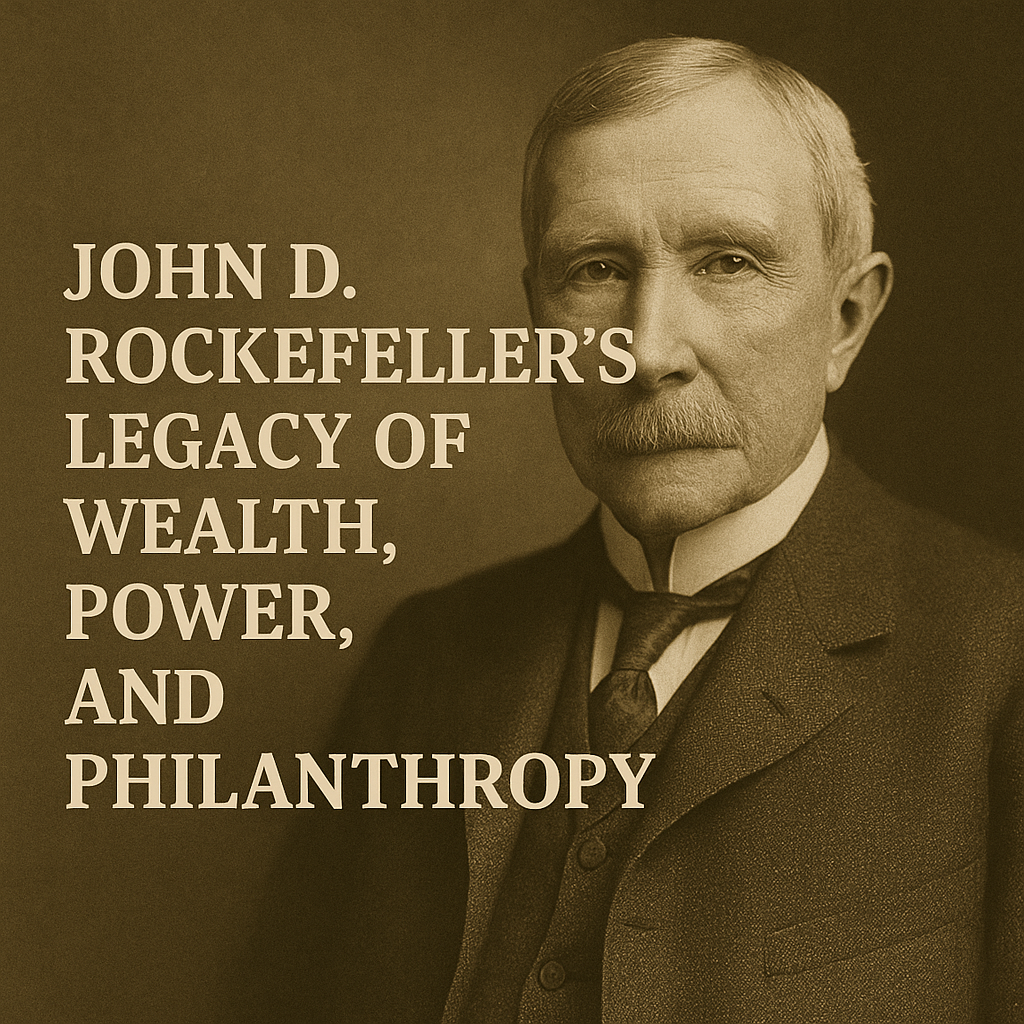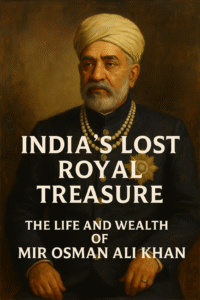John D. Rockefeller is one of the most iconic and controversial figures in the history of American capitalism. Born in 1839, Rockefeller’s life was a tale of ambition, enterprise, and transformation. He built Standard Oil into one of the most powerful monopolies the world had ever seen, becoming the richest man in modern history along the way. But his story wasn’t just about money—it was about vision, strategy, and a relentless drive to dominate the industry. He played a pivotal role in shaping the modern corporate landscape and set new standards in philanthropy that continue to influence the world today. His name is synonymous with both ruthless business tactics and extraordinary generosity. To understand Rockefeller is to understand the rise of corporate America, the evolution of capitalism, and the complexities of wealth. This post explores the man behind the empire and the legacy that still echoes in the halls of business, finance, and charity.
- Early Life And The Seeds Of Ambition
- Building Standard Oil And Dominating An Industry
- The Birth Of Antitrust And The Breakup Of A Giant
- Philanthropy And Redefining The Role Of Wealth
- The Man Behind The Myth
- The Legacy That Still Shapes Our World
- Follow My Journey And Get Inspired To Transform Your Life For The Better
Early Life And The Seeds Of Ambition
John Davison Rockefeller was born on July 8, 1839, in Richford, New York. His father, William Avery Rockefeller, was a traveling salesman known for being charming yet untrustworthy—a self-proclaimed “botanic physician” who peddled elixirs of questionable merit. His mother, Eliza, was the moral compass of the family, deeply religious and thrifty. It was from her that John inherited his frugality, discipline, and Baptist values.
At a young age, Rockefeller moved with his family to Cleveland, Ohio. By the age of 16, he had secured a job as an assistant bookkeeper. What stood out was his meticulous attention to detail and an almost obsessive sense of order. He kept records of every penny he earned or spent—a habit he maintained for life.
This early exposure to numbers, coupled with an ironclad work ethic, laid the groundwork for his entry into business. He once said, “I had no ambition to make a fortune. Mere money-making has never been my goal. I had an ambition to build.”
Building Standard Oil And Dominating An Industry
In 1863, Rockefeller entered the oil business during the Pennsylvania oil rush. Alongside several partners, he opened a refinery in Cleveland. Within a few years, he founded the Standard Oil Company in 1870. What followed was a period of aggressive expansion that would forever change the nature of commerce in America.
Standard Oil quickly became known for its ruthless efficiency and strategic takeovers. Rockefeller mastered vertical integration—controlling every part of the supply chain, from production to distribution. By negotiating secret deals with railroads, he was able to undercut competitors and eventually buy them out.
By the 1880s, Standard Oil controlled around 90% of all oil refining in the United States. This dominance sparked widespread public concern and drew the attention of lawmakers. Critics argued that Rockefeller’s methods crushed competition and hurt consumers. To many, he represented the dark side of capitalism.
Yet, from a purely business perspective, Rockefeller was a genius. He streamlined operations, reduced waste, and set the foundations for modern corporate management. His influence helped create the framework for multinational corporations and shareholder capitalism.
The Birth Of Antitrust And The Breakup Of A Giant
With power came scrutiny. In 1890, the U.S. government passed the Sherman Antitrust Act, targeting monopolistic business practices. Standard Oil became the most prominent target.
In 1911, after a long legal battle, the Supreme Court ruled that Standard Oil must be dismantled due to its monopolistic practices. The company was broken into 34 independent companies, many of which—like Exxon, Chevron, and Mobil—would go on to become giants in their own right.
Ironically, the breakup made Rockefeller even richer. He owned significant shares in all the spun-off companies, and their combined value soared. By the time of his death in 1937, his wealth (adjusted for inflation) was equivalent to over $400 billion today—making him arguably the wealthiest individual in modern recorded history.
The breakup of Standard Oil also marked a turning point in U.S. economic history. It sent a clear message that even the most powerful corporations were not above the law and established the government’s role in regulating large business entities.
Philanthropy And Redefining The Role Of Wealth
Despite his image as a ruthless capitalist, Rockefeller saw himself as a deeply moral man. In his later years, he shifted focus from business to philanthropy. Guided by the principles of the Social Gospel and inspired by his devout Christian faith, he believed that wealth should be used to serve the greater good.
In 1913, he founded the Rockefeller Foundation, which became one of the most influential charitable organizations in the world. The foundation tackled global health, education, and scientific research. It funded efforts to eradicate diseases like hookworm and yellow fever and supported groundbreaking work in medicine and public health.
He also established the University of Chicago, turning it into a world-class institution, and contributed significantly to Spelman College, a historically Black women’s college in Atlanta. Rockefeller’s philanthropic model was revolutionary at the time—it wasn’t just about giving money but building enduring institutions that could address systemic issues.
His approach to charity laid the groundwork for modern philanthropic foundations and influenced later magnates like Bill Gates and Warren Buffett.
The Man Behind The Myth
Rockefeller was a man of contradictions. He lived modestly despite his immense wealth. He wore simple clothes, avoided flashy parties, and followed a strict daily routine. He was a devout Baptist who taught Sunday school and believed in tithing a portion of his income from an early age.
But he also had a reputation for being cold and calculating in business. He rarely showed emotion and valued control above all else. He was intensely private and often shunned the limelight, even as he became one of the most talked-about men in America.
To his critics, he was a robber baron. To his admirers, a visionary industrialist. The truth lies somewhere in between. He was both a product of his time and a shaper of it. His life invites reflection on the dual nature of capitalism—its power to create and its potential to exploit.
One thing is certain: Rockefeller left a mark on the world that few others have. Whether building business empires or funding life-saving research, his influence is undeniable.
The Legacy That Still Shapes Our World
Nearly a century after his death, John D. Rockefeller’s legacy continues to ripple through the fabric of society. His business tactics are studied in MBA programs. His philanthropic innovations are standard practice among modern billionaires. And his name is still synonymous with wealth.
His descendants have carried on his philanthropic work through the Rockefeller Brothers Fund and the continued activities of the Rockefeller Foundation. While the family’s influence in business has waned, their contributions to global policy, environmental causes, and social justice remain significant.
Rockefeller didn’t just make money—he helped invent the modern economy. He showed how capital, when paired with vision and discipline, could shape the destiny of nations. But he also demonstrated the moral complexity of wealth. His life reminds us that with great power comes great responsibility.
Whether you see him as a villain or a visionary, John D. Rockefeller is a figure who cannot be ignored. His story is not just a tale from the Gilded Age but a mirror reflecting our ongoing debates about capitalism, fairness, and the true purpose of wealth.
I am working on building a passive income stream using the internet. If you would like to do the same take a look at this business by clicking here.
This business can be operated using the internet and the start up cost is low. I don’t have to leave my current employment to work on building this global business.
If you like what you see, work with me to build a passive income stream using this global business.
I do not provide personal investment or financial advice and I am not a qualified licensed investment advisor. I am documenting my online investment and financial journey and what’s working for me. Click Here to read disclaimer.
If you found value in this post and want to support my work, click here to buy me a coffee.
Subscribe to my list for valuable updates, tools, videos and articles that I will share as I come across them.
Let me know your thoughts on this post via the comments section. You can also add your insights and suggestions.
If you enjoyed reading this post or it added some value, please share it with others.

Follow My Journey And Get Inspired To Transform Your Life For The Better
“I may earn commissions as an affiliate from sponsored links within this post”





